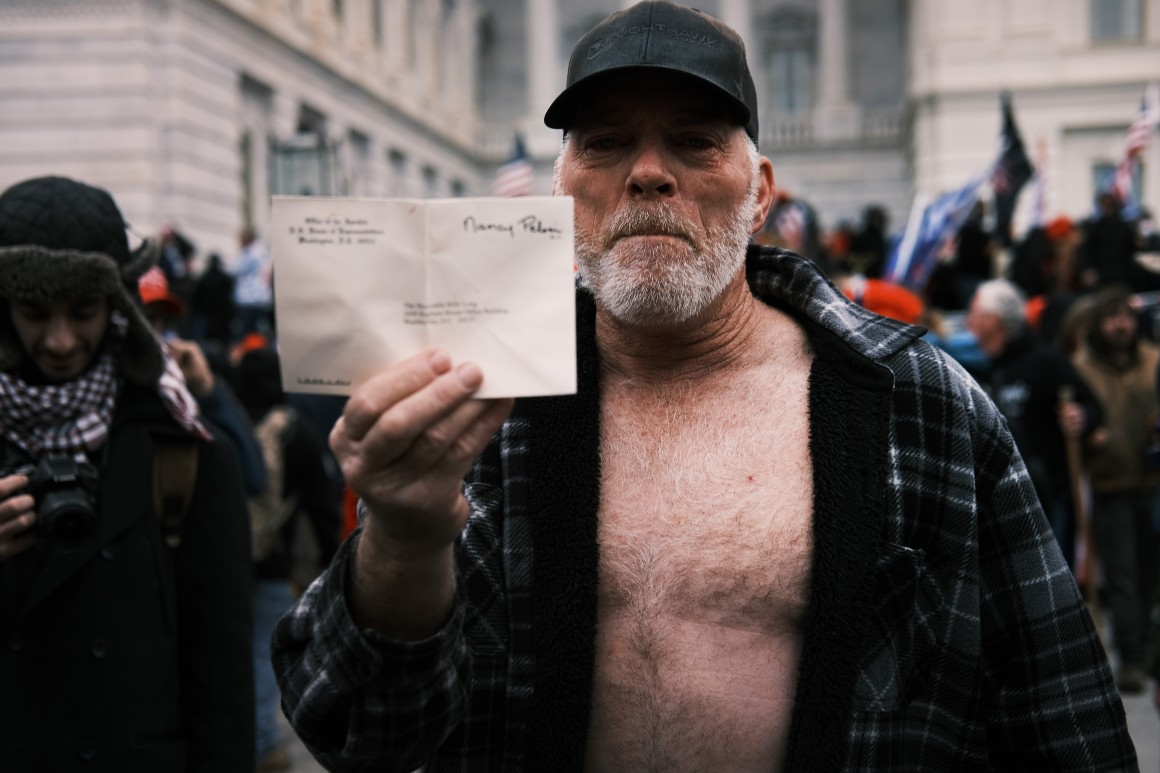A federal magistrate judge on Friday ordered the release of an Arkansas man who became one of the most recognized figures in last week’s Capitol riot by entering House Speaker Nancy Pelosi’s office and being photographed propping his feet up on a desk there.
Following a five-hour hearing, Richard Barnett, 60, won permission to return home as he awaits trial on charges of entering Capitol grounds with a stun-gun, disorderly conduct and theft.
Immediately after Fayetteville, Ark.-based U.S. Magistrate Judge Erin Weidemann announced she planned to release Barnett on “very, very restrictive conditions,” Assistant U.S. Attorney Kim Harris asked that Barnett’s release be delayed for three days so that lawyers from the U.S. Attorney’s office in Washington could appeal the decision.
Weidemann did not immediately rule on the request for a stay, but said Barnett’s release would not take place before Saturday at the earliest.
During the unusually lengthy detention hearing, prosecutors presented Barnett as a dangerous person who had acted deceitfully following the events at the Capitol by turning off the location services on his cell phone, paying only cash and covering his face.
Harris said Barnett had made “a mockery of [Pelosi] and her office.” The prosecutor also said that in the various images of Barnett in the Capitol he seemed to “very much enjoy this moment of fame.”
Prosecutors also played video of Barnett buying a stun-gun, walkie-talkies and pepper spray at a Bass Sporting Goods store in Arkansas on New Year’s Eve. They said his cell phone and the stun gun have not been found, suggesting repeatedly during the hearing that he ditched them in a bid to hide incriminating evidence.
Barnett’s defense attorney Anthony Siano countered by calling about half a dozen witnesses to testify to Barnett’s good character and honesty.
One unusual aspect of the session was that the judge heard testimony not only about the threat Barnett would or would not pose to the community, but also about a slew of threats he and his family received after his image went viral following the storming of the Capitol by a pro-Trump crowd on Jan. 6.
Wiedemann ultimately decided to release Barnett under what she called “very, very restrictive” conditions that she called “home incarceration.” She ordered that the defendant be put under GPS monitoring and have no access to the internet.
The judge said the limits on Barnett’s communications were in response to “concerns the government has regarding the upcoming inauguration and the climate right now."
“He appears to be a law abiding citizen, for the most part, although there have been incidents that do cause the court concern with him being armed at rallies,” the judge added.
Siano did make a passing complaint to Wiedemann that while his client is facing serious charges, those who organized and spoke to the “Stop the Steal” rally that devolved into the Capitol riot have not been charged.
"A defense lawyer in my position might surely be tempted to say to the court that no one who stepped to the podium or that promoted this event has been brought before the bar of justice,” Siano said.
Siano also said Barnett shouldn’t be penalized for his strong political views. “The fact that my client is outspoken and is a very, very enthusiastic supporter of Donald J. Trump and is a very enthusiastic supporter of the 2nd Amendment is not a basis for any charge in this case,” Siano said.
Siano added that the threats anonymous “crackpots and kooks” made against Barnett shouldn’t be a reason to deny him bail.
Harris said the government’s appeal of Weidemann’s order will go to the chief judge of the U.S. District Court in Washington, Beryl Howell.





















